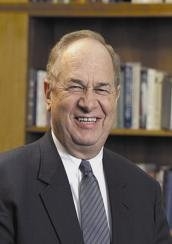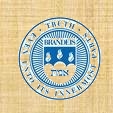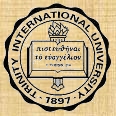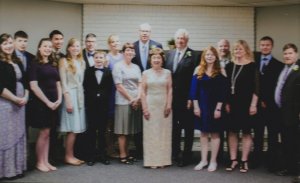About Dr. Kaiser
Walter Christian Kaiser, Jr. was born into a German Baptist (now
North American Baptist) home on April 11,1933, in Folcroft,
Pennsylvania.
 He was the oldest of the six children of Walter Christian Kaiser
Sr., a farmer and a godly Christian leader in the local church, and
Estelle Jaworsky Kaiser. Feeling obliged to worship in the
community where they lived and worked, the family attended an
independent fundamental church in Folcroft [IFCA]. At that time
Kaiser came under the influence of Scofield Reference Bible and
dispensational teaching. Later, during his seminary days, Kaiser
would discover Willis J. Beecher’s
Prophets and The Promise,
and a revolution would take place in his thinking that would carry
with it a large portion of contemporary evangelical scholarship.
Instead of casting his dispensational heritage aside, this
revolution swept it back into the broader heritage of the nineteenth
century whence it had come. This was to be an ongoing theme in the
life and work of Kaiser-a linking of the burgeoning postwar
evangelicalism of the twentieth century with its rich and nearly
forgotten spiritual heritage from the past. In the end,
Kaiser’s approach to Scripture, which he calls promise theology [or
“epangelicalism” (sic)], would prove to be an effective means of
transcending the narrow walls that had built up around modern
evangelicalism.
He was the oldest of the six children of Walter Christian Kaiser
Sr., a farmer and a godly Christian leader in the local church, and
Estelle Jaworsky Kaiser. Feeling obliged to worship in the
community where they lived and worked, the family attended an
independent fundamental church in Folcroft [IFCA]. At that time
Kaiser came under the influence of Scofield Reference Bible and
dispensational teaching. Later, during his seminary days, Kaiser
would discover Willis J. Beecher’s
Prophets and The Promise,
and a revolution would take place in his thinking that would carry
with it a large portion of contemporary evangelical scholarship.
Instead of casting his dispensational heritage aside, this
revolution swept it back into the broader heritage of the nineteenth
century whence it had come. This was to be an ongoing theme in the
life and work of Kaiser-a linking of the burgeoning postwar
evangelicalism of the twentieth century with its rich and nearly
forgotten spiritual heritage from the past. In the end,
Kaiser’s approach to Scripture, which he calls promise theology [or
“epangelicalism” (sic)], would prove to be an effective means of
transcending the narrow walls that had built up around modern
evangelicalism.
 as a teaching assistant to [Robert D.Culver]. Kaiser worked
his way through both college and seminary, still finding time to
sing in the chapel choir and to teach in Sunday schools on Chicago’s
South Side.
as a teaching assistant to [Robert D.Culver]. Kaiser worked
his way through both college and seminary, still finding time to
sing in the chapel choir and to teach in Sunday schools on Chicago’s
South Side.By his own reckoning, Kaiser’s interest in the Old Testament was first sparked by a high school biology class in which the Genesis account was kindly, but firmly, debunked. When Kaiser dared to voice another opinion, he was challenged to do a report that would convince his teacher otherwise. Undaunted, Kaiser prepared a forty-page paper complete with anthropological drawings and bibliography. His interest in the Old Testament continued while at Wheaton College. Though most of his classmates were planning to go into the New Testament studies or theology, Kaiser felt the call, from both his early experiences and a perceived need, to enter graduate studies in the Old Testament. While pursuing his B.D. degree at Wheaton Graduate School, he studied Hebrew for the first time. His Hebrew professor was Frank Newberg, a pioneer in his own right, who had earned his doctorate under William F. Albright at John’s Hopkins. Kaiser’s other professors at Wheaton Graduate School included Arthur Holmes, Kenneth Kantzer, and Berkeley Mickelson.
Kaiser was married Margaret just before his final year of study at Wheaton Graduate School. During the last year, in addition to teaching two senior apologetics courses at Wheaton College, Kaiser served as assistant pastor at the Geneva Baptist Church (General Conference), where his responsibilities included preparing the worship bulletins each week, pastoral calls, and teaching an adult Sunday school class.
After graduating from Wheaton Graduate School in 1958, Kaiser taught full-time at Wheaton College. During the summer months he
 pursued
further graduate studies in Old Testament and ancient history at
Brandeis University, where
his mentors included Benjamin Mazar, Samuel Noah Kramer, Harry
Orlinsky, and Cyrus H. Gordon. His course of study at Brandeis
included Middle and Late Egyptian hieroglyphics, Ugaritic, Homeric
Greek, biblical Hebrew, Old Babylonian cuneiform, Assyrian
cuneiform, and the history and archeology of the ancient Near
Eastern empires.
pursued
further graduate studies in Old Testament and ancient history at
Brandeis University, where
his mentors included Benjamin Mazar, Samuel Noah Kramer, Harry
Orlinsky, and Cyrus H. Gordon. His course of study at Brandeis
included Middle and Late Egyptian hieroglyphics, Ugaritic, Homeric
Greek, biblical Hebrew, Old Babylonian cuneiform, Assyrian
cuneiform, and the history and archeology of the ancient Near
Eastern empires.
In the late fall of 1963, Kaiser was asked to teach a class at
Trinity Evangelical Divinity School when the instructor, Wilbur
Smith, suddenly took ill. In 1964 Kaiser began a two-year term
of teaching at both Trinity and Wheaton. In the fall of 1966 he joined the Trinity faculty on a
full-time basis. While pursuing graduate studies at Brandeis, Kaiser
became professor and chairman of the Old Testament department at
Trinity. He completed his Ph.D. dissertation in 1973.
and Wheaton. In the fall of 1966 he joined the Trinity faculty on a
full-time basis. While pursuing graduate studies at Brandeis, Kaiser
became professor and chairman of the Old Testament department at
Trinity. He completed his Ph.D. dissertation in 1973.
In 1980 Kaiser assumed the responsibilities of vice president and
academic dean of Trinity and continued in that office until June of
1992. In the fall of 1993 he accepted and invitation from
Gordon-Conwell Theological Seminary to serve as the first Colman M.
Mockler Distinguished Professor of Old Testament. He taught during the fall
semester, and lived on his Wisconsin farm and spoke around the world
the remaining eight months of the year. In the summer of 1997 Kaiser
assumed the presidency of Gordon-Conwell while retaining the Mockler
chair. In addition to being a Wheaton College trustee since 1982,
Kaiser has served on various other boards.1)Written by John H. Sailhamer
Distinguished Professor of Old Testament. He taught during the fall
semester, and lived on his Wisconsin farm and spoke around the world
the remaining eight months of the year. In the summer of 1997 Kaiser
assumed the presidency of Gordon-Conwell while retaining the Mockler
chair. In addition to being a Wheaton College trustee since 1982,
Kaiser has served on various other boards.1)Written by John H. Sailhamer
Kaiser retired from the presidency of Gordon-Conwell on July 1, 2006. Currently he is President Emeritus and Distinguished Professor of Old Testament and Ethics at Gordon-Conwell Theological Seminary in Hamilton, MA.
In the fall of 2013 Kaiser lost Margaret, his wife of 56 years to
cancer. He continued to live at the farm in Wisconsin until the
spring of 2017 when he met and married Nancy Veldbloom of Oostburg,
WI. Walter and Nancy reside currently in Oostburg, WI.
